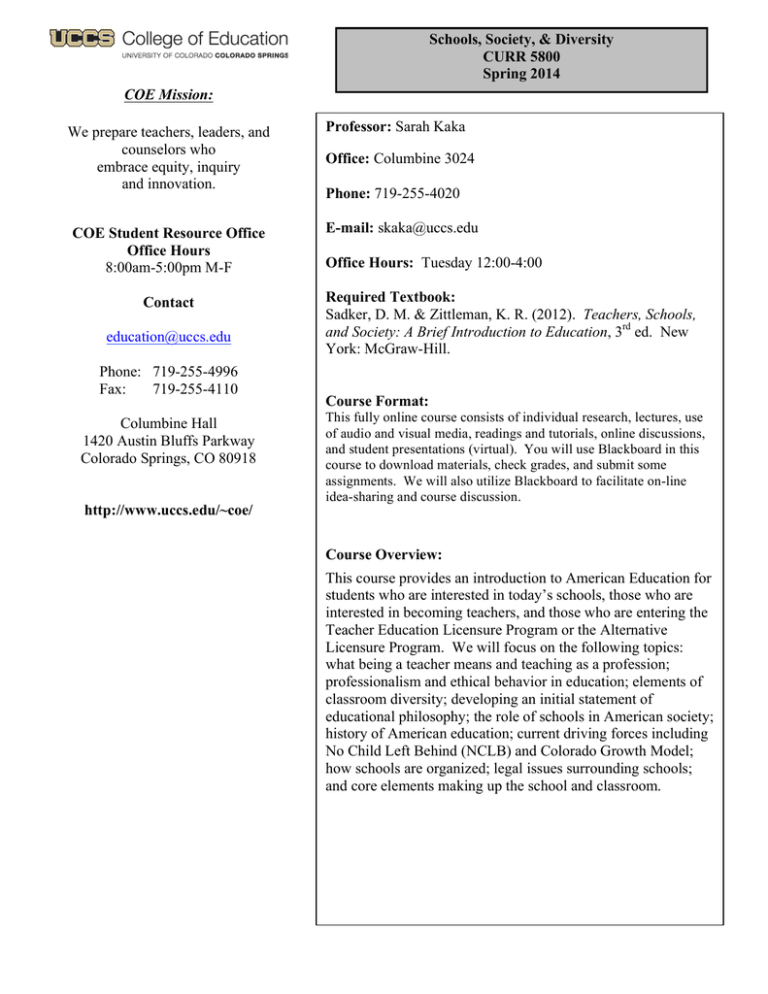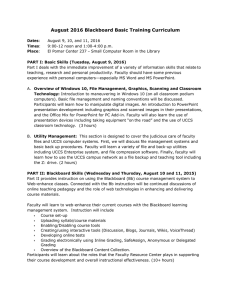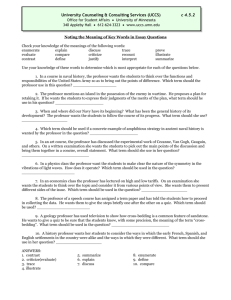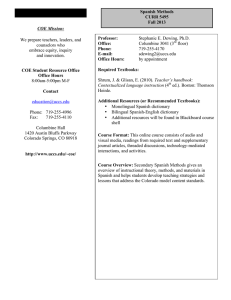Document 10375223
advertisement

Schools, Society, & Diversity CURR 5800 Spring 2014 COE Mission: We prepare teachers, leaders, and counselors who embrace equity, inquiry and innovation. COE Student Resource Office Office Hours 8:00am-5:00pm M-F Contact education@uccs.edu Phone: 719-255-4996 Fax: 719-255-4110 Columbine Hall 1420 Austin Bluffs Parkway Colorado Springs, CO 80918 http://www.uccs.edu/~coe/ Professor: Sarah Kaka Office: Columbine 3024 Phone: 719-255-4020 E-mail: skaka@uccs.edu Office Hours: Tuesday 12:00-4:00 Required Textbook: Sadker, D. M. & Zittleman, K. R. (2012). Teachers, Schools, and Society: A Brief Introduction to Education, 3rd ed. New York: McGraw-Hill. Course Format: This fully online course consists of individual research, lectures, use of audio and visual media, readings and tutorials, online discussions, and student presentations (virtual). You will use Blackboard in this course to download materials, check grades, and submit some assignments. We will also utilize Blackboard to facilitate on-line idea-sharing and course discussion. Course Overview: This course provides an introduction to American Education for students who are interested in today’s schools, those who are interested in becoming teachers, and those who are entering the Teacher Education Licensure Program or the Alternative Licensure Program. We will focus on the following topics: what being a teacher means and teaching as a profession; professionalism and ethical behavior in education; elements of classroom diversity; developing an initial statement of educational philosophy; the role of schools in American society; history of American education; current driving forces including No Child Left Behind (NCLB) and Colorado Growth Model; how schools are organized; legal issues surrounding schools; and core elements making up the school and classroom. Course Objectives: Students will be able to: 1) Recognize the roles, responsibilities and rewards of being a professional teacher. 2) Describe the role of public education in American society, both historically and currently. 3) Explain the complex context in which public education operates. 4) Explain how schools are organized and governed. 5) Identify the philosophical, historical and social foundations of American public education. 6) Discuss current issues affecting American public education today. 7) Demonstrate knowledge and understanding of the context of contemporary American education, past and present developments, issues, research, and social influences in the field of education. 8) Describe possible directions for education in the twenty first century. 9) Use technology as a tool and a support for learning including email, the Internet, and Blackboard. How to be successful in this course: • Review all course materials (e.g., readings, videos, tutorials, etc.) which will be assigned each week • Stay on track with the weekly outline provided by the instructor • Save and backup all assignments while you are working and after completion. I recommend saving on an external thumb drive AND locally on your machine • Plan ahead and do not procrastinate. Leave ample time to finish your assignments and make necessary edits/revisions • Be patient and persistent. While I will do my best to minimize technical glitches, they may occur. Patience and persistence also applies when working with a new technology, as a learning curve will likely exist! • Communication is key. Since this is an online course and we will not be meeting in person each week, you must contact with me any and all questions or concerns. Weekly tasks, assignments, and threaded discussions: Your reading, thinking, and experiences are valued and essential. Regular weekly contributions to the discussions are critical. Since this is an online course, this will be our main form of communication. Your active participation is essential. Because an online course is “asynchronous,” rather than “live,” in order to re-create some of the type of discussions, sharing of information, and project work that you would do in a “live” classroom, you will need to check in to the course page often. Frequent short visits to the course page are recommended to read and post to discussion threads and to see what your classmates and instructor have posted for new resources, all work much better in an online environment than waiting until the end of the week’s module to make one long visit. In addition, your frequent participation enhances the learning experiences of the entire class. Threaded Discussions Your participation points for the threaded discussion cannot be made up if you did not participate during the week. The purpose of these discussions is to discuss topics with your classmates. Some weeks you will be required to participate in both the Weekly Discussion Thread in addition to the General Thoughts Discussion. You are required to both answer the discussion questions as well as engage in thoughtful dialogue by commenting on other student’s thoughts. Final weekly activities will be due on Sunday (at midnight). Tasks submitted beyond these weekly parameters will be considered late and are subject to 2 downgrading. Discussions are weekly; Modules are bi-weekly. Please do not wait until Sunday night of the second week of the Module to post in both weekly discussions. Example of a well thought out/developed response: “I believe that in order to know what to take from the different theories you need to first take a step back and evaluate what your beliefs are as a teacher. Then you need see what parts of what theories fit into your beliefs. Once that has been done I believe it is important to just start trying different things. One part of a theory may work with one child but not with another. I believe it is important to remember that just because one idea does not work with one child does not mean it will not work with another child two years down the road. It is also important to keep in mind that sometimes as a teacher it will take more than one try in order to put a theory into practice in a way that works for your classroom. It is important to keep an open mind, to try new things, and sometimes to go back and try old practices.” Used with permission from Shelley Carpinello, 09/14/05 Examples of an unacceptable response. What do you think? Looks good. I agree Course Communication: The majority of course communication will be conducted through email or Blackboard. All students must obtain a UCCS email address and check it regularly (at least every other day) so as not to miss announcements and other relevant course information. Suggestion: if your UCCS address is not your primary one, have e-mails from it automatically forwarded to the one you check regularly. I do my best to respond to email within 24 hours. Preparation and Participation: Like the instructor, students are expected to be thoroughly prepared, meaning assigned reading and related questions have been completed on time. In other words, it is assumed that the major concepts, definitions, examples, and procedures presented in this online course and from previous classes are understood well enough to be discussed; individual or group assignments have been prepared; and the student is ready to engage in the weekly course activities. Class participation and consistent online presence is vital for acquiring the knowledge necessary to meet the course objectives. Additionally, students’ presence and participation contribute to an interchange of ideas and experiences that benefit everyone, especially in an online learning community. All online interactions will be conducted in an environment of mutual courtesy and respect for other students. Excessive absences from course activities or failure to participate with proper courtesy and respect will result in a lowering of your grade. Late Policy: Assignments will be due on the designated date (see course schedule presented in this syllabus). No late assignments will be accepted unless prior approval is gained. Assignments received later than the due date will receive an automatic 10% reduction in grade for every day in which the assignment is late. Technology Competencies: It is expected that students begin our program with foundational technology skills that include digital word processing, digital and online formats (e.g. Blackboard) and using online research databases. Knowledge of the use of technology-supported multimedia, such as PowerPoint and other audio/video resources, is expected. Students who need 3 assistance with building technological skills should speak with their professor to learn about technology resources in the COE and at UCCS. Using your UCCS email account is a requirement of this course due to digital delivery of course content. All students must obtain a UCCS email address and check it regularly (every day) so as not to miss announcements. If your UCCS email address is not your primary one, please have emails from UCCS rerouted to the one you check daily. Professional Behavior: Professional behavior is necessary for you to be a successful member of a learning community. Please monitor your participation in class discussions and group work and find ways to contribute intelligently to the discussion without silencing others. All written assignments must be computer generated unless otherwise indicated by the professor. Professional behavior will be expected in your future teaching/counseling career and is often the hallmark of career success. Diversity Statement: The faculty of the College of Education is committed to preparing students to recognize, appreciate, and support diversity in all forms – including ethnic, cultural, religious, gender, economic, sexual orientation and ability – while striving to provide fair and equitable treatment and consideration for all. Any student who believes that he/she has not been treated fairly or equitably for any reason should bring it to the attention of the instructor, Department Chair or the Dean of the College of Education. Accommodations: The College of Education wishes to fully include persons with disabilities in this course. In compliance with section 504 and the Americans with Disabilities Act (ADA), UCCS is committed to ensure that “no otherwise qualified individual with a disability … shall, solely by reason of disability, be excluded from participation in, be denied the benefits of, or be subjected to discrimination under any program or activity…” If you are a student with a disability and believe you will need accommodations for this class, it is your responsibility to contact and register with the Disabilities Services Office, and provide them with documentation of your disability, so they can determine what accommodations are appropriate for your situation. To avoid any delay in the receipt of accommodations, you should contact the Disability Services Office as soon as possible. Please note that accommodations are not retroactive and disability accommodations cannot be provided until a “Faculty Accommodation Letter” from the Disability Services office has been given to the professor by the student. Please contact Disability Services for more information about receiving accommodations at Main Hall room 105, 719-255-3354 or dservice@uccs.edu . Military Students: Military students who have the potential to participate in military activities including training and deployment should consult with faculty prior to registration for any course, but no later than the end of the first week of classes. At this time, the student should provide the instructor with a schedule of planned absences, preferably signed by the student's commander, in order to allow the instructor to evaluate and advise the student on the possible impact of the absences. In this course, the instructor will consider absences due to participation in verified military activities to be excused absences, on par with those due to other unavoidable circumstances such as illness. If, however, it appears that military obligations will prevent adequate attendance or performance in the course, the instructor may advise the student to register for the course at another time, when she/he is more likely to be successful. 4 Student Appeals: Students enrolled in programs or courses in the College of Education may access the COE Appeal/Exception Form at: http://www.uccs.edu/Documents/coe/studentresources/AppealsForm2009.pdf. This form is to be used for an appeal when a student is: (1) denied admission to professional education program (2) denied permission to student teach or complete professional internship (3) removed from a professional education program or internship (4) denied permission to graduate due to missing requirements (5) requesting an exception to specific policies, procedures, or requirements (6) requesting a grade change This form is not to be used for requests to take classes out of sequence or to take a class without the proper prerequisites. Such requests should be initiated with the department chair. UCCS Student Code of Conduct: The purpose of the Student Code of Conduct is to maintain the general welfare of the university community. The university strives to make the campus community a place of study, work, and residence where people are treated, and treat one another, with respect and courtesy. http://www.uccs.edu/~oja/student-conduct/student-code-of-conduct.html UCCS Student Rights and Responsibilities: http://www.uccs.edu/orientation/student-rights-and-responsibilities.html UCCS Academic Ethics Code: http://www.uccs.edu/Documents/vcaf/200-019%20StudentAcademic%20Ethics.pdf Assignments See ‘CURR 5800 Assignment Requirements’ file on BB for specific requirements for each assignment. Course Grading: Weekly on-line presence to include checking in on Blackboard, timely completion of assignments, participation in online course activities and discussion (15 weeks @ 15 pts/week- all points given at end) Personal Introduction Assignment—I Too Sing America Interview with a Teacher Written Code of Ethics paper Written report on Education film Written Philosophy of Education Top 10 slideshow Written report of preview of Colorado Department of Education’s SchoolView School Board Meeting written report Written Summary of Utopian School Final Exam TOTAL: 225 pts. 10 pts. 25 pts. 50 pts. 40 pts. 50 pts. 20 pts 50 pts 25 pts 40 pts. 100 pts. 635 points A 94% - 100% A- 90% - 93% B+ 87% - 89% B 84% - 86% B- 80% - 83% Note: You must get at least a B- in this course in order to be admitted to the TELP Program. 5 (*Be sure to check Blackboard > Course Content > for specific Module course activities and assignments. The general course outline is specified, below.) Modules Course Content Readings for that Module Due Dates and Presentation Topics Mod 1 Syllabus, Expectations, “I, Too, Sing America” Assignments, Standards poem and personal January 21-­‐ introduction due by end of February 2 What are the rewards of module (assignments are teaching? What are the due the last day of the challenges of teaching? module unless otherwise What is the relationship noted) of schooling and education? What is the purpose of schooling? What are cognitive, affective, and physiological elements of education? Why Is public education in the United States controversial? How are teachers compensated? Mod 2 Chapter 1: “Interview with a Teacher” Read Chapter 1: The Teaching write-­‐up due February 3-­‐ What are the essential Profession and You—Do I 16 characteristics of Really Want to Be a Teacher? professionalism? Is teaching a profession? Define and explore ethical practice for educators. Mod 3, week Chapter 2: 1 Read Chapter 2: Different Impact of: Ways of Learning—Oops, all February Kids are Not the Same 17-­‐23 Ability; Cultural diversity; Gender diversity; Exceptionality; Language; Socioeconomic Status (SES). Focus on ability: What does “intelligence” really mean? How many kinds of intelligences are there? How does Maslow’s Hierarchy of Needs impact classroom learning? How is Bloom’s Taxonomy a valuable tool to structure classroom lessons? What are student learning styles? How should classrooms best be organized to meet 6 Mod 3, week 2 February 24-­‐March 2 Mod 4 March 3-­‐16 the needs of different learning styles? Chapter 3 & 4: Focus on SES: Identify the different dimensions of student diversity. Explain how these dimensions will influence your work as a teacher. How do deficit, expectation, and cultural difference theories explain disparate academic performance among various racial, ethnic, and cultural groups? Focus on Race and Culture: What are the purposes of multicultural education? Why is culturally responsive teaching important? How can teachers use culturally responsive teaching strategies? Chapter 6: What is philosophy of education, and why should it be important to you? How do you define each of the major philosophies practiced in U. S. classrooms— essentialism; perennialism; progressivism; and existentialism/social reconstructionists? How do teacher-­‐centered philosophies of education differ from student-­‐ centered philosophies of education? How are these philosophies reflected in school/classroom practices? Written Code of Ethics due Read Chapter 3: Teaching Your Diverse Students—Helping Diverse Learners Succeed in Today’s Classrooms Read Chapter 4: Student Life in School and at Home—Changes in American Society: Their Influences on Today’s Schools Read Chapter 6: Philosophy of Education— The Intellectual Foundations of American Education 7 American Education film paper due Mod 5 March 17-­‐ April 6 Mod 6 April 7-­‐20 Mod 7 April 21-­‐ May 4 Chapter 5: How has public education evolved in America? What are significant trends and milestones in American education? How is education in the U. S. the same/different as education in other nations? What is the history of reform in education? What is the current status of U. S. Educational reform? Educational Reform Chapter 7: Why do teachers need to know about finance and governance? How does the federal government influence education? What are the major sources of educational funding? What is the state role in education? How does each state govern education? What is the role of the local school district? What is the role of the local school board? How are schools governed at the local level? What role do school districts play in governing education? How are educational revenues spent? What are the major causes of funding inequities in education? What are some proposed solutions to the problem? Chapter 9: What are the characteristics of effective schools? Do the laws of the marketplace belong in public education? Chapter 8: Who is legally responsible for governing education in the United States? Read Chapter 5: The Multicultural History of American Education— Education in the United States: Its Historical Roots Philosophy of Education is due Slideshow: Top 10 Events in American Education due Read Chapter 7: Financing and Governing America’s Schools— The Organization of American Schools Read Chapter 9: Schools: Choice and Challenges— Whatever happened to the neighborhood school? Written report of preview of Colorado Department of Education’s SchoolView software is due Read Chapter 8: School Law and Ethics—Ethical and Legal Influences on Teaching Attend a local School Board (BOE) Meeting and submit report. 8 Mod 8 May 5-­‐17 What are the impacts of the following amendments to the U. S. Constitution on education—1st; 4th; 10th, and 14th? What are the legal rights and responsibilities as a teacher? What legal rights do students enjoy? Chapter 10: What classroom management skills foster academic achievement? What are the roles of teachers and students in the pedagogical cycle? What questioning strategies increase student achievement? How can teachers use technology to support effective instruction? Chapter 11: What are the stages of teacher development? What classroom management skills foster academic achievement? What are the roles of teachers and students in the pedagogical cycle? What questioning strategies increase student achievement? Final Exam. Read Chapter 10: Curriculum, Standards, and Testing—The Curriculum in an Era of Standards and Accountability Read Chapter 11: Becoming an Effective Teacher Written Summary of Simulation—Utopia Elementary is due on Sunday, May 11. Complete final exam. Final Exam due no later than 5 pm on Saturday, May 17. 9 Alignment of Course Objectives, Standards, and Conceptual Framework STANDARDS Course Objective Assignment, Activity, or Required Reading(s) Recognize the roles, responsibilities and rewards of being a professional teacher. Describe the role of public education in American society, both historically and currently. Explain the complex context in which public education operates. Explain how schools are organized and governed. Identify the philosophical, historical and social foundations of American public education. Discuss current issues affecting American public education today. Demonstrate knowledge and understanding of the context of contemporary American education, past and present developments, issues, research, and social influences in the field of education. Describe possible directions for education in the twenty first century. Use technology as a tool and a support for learning including email, the Internet, and Blackboard. 10 COE Conceptual Framework



